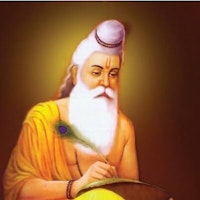Truth has many aspects. Infinite truth has infinite expressions. Though the sages speak in diverse ways, they express one and the same Truth.
Srila Vyasadeva

Truth Has Many Aspects
Topic: Truth, Law, & Principle
Truth has many aspects. Infinite truth has infinite expressions. Though the sages speak in diverse ways, they express one and the same Truth.
Ignorant is he who says, “What I say and know is true; others are wrong.” It is because of this attitude of the ignorant that there have been doubts and misunderstandings about God.
This attitude it is that causes dispute among men. But all doubts vanish when one gains self-control and attains tranquility by realizing the heart of Truth. Thereupon dispute, too, is at an end.
Srila Vyasadeva, a distinguished sage in Indian spirituality, is renowned for shaping the spiritual literature that guides many. Born to Parashara Muni and Satyavati, his destiny was intertwined with spiritual enlightenment. His most notable work, the Srimad Bhagavatam, serves as a direct commentary on the Vedanta-sutra, guiding readers towards the understanding of God. Besides this, Vyasadeva edited the Vedas and authored the epic Mahabharata, making him a central figure in the propagation of Vedic knowledge.
Vyasadeva is revered not just as a scholar but as an incarnation of the divine Vishnu, as detailed in sacred texts like the Bhagavata Purana. His incarnation was a divine response to make the complex Vedic wisdom accessible to all. He divided the singular Veda into four – Rig, Yajur, Sama, and Atharva – and created sub-branches, a task believed beyond the capability of a regular being. This incarnation of Vyasadeva, unique to this age, is particularly significant, being an embodiment of Lord Narayana himself, underlining his exceptional spiritual status.
Vyasadeva's deeper spiritual journey is revealed through his creation of the Srimad Bhagavatam. Despite his extensive literary works, a sense of incompleteness led him to this masterpiece, which is a detailed exposition of Vedic philosophy, focusing on Bhagavan Sri Krishna. This work not only addressed his spiritual discontent but also became a pivotal guide in understanding spiritual truth. The Srimad Bhagavatam, emphasizing bhakti-yoga and direct spiritual practice, stands as a vital resource for seekers pursuing the highest spiritual truths. Thus, Srila Vyasadeva remains a guiding light for those seeking deeper understanding and connection with the divine.
Srimad Bhagavatam
Wilson, Andrew, editor. World Scripture - a Comparative Anthology of Sacred Texts. Paragon House, 1991, p. 39 [Srimad Bhagavatam 11.15].

Srila Vyasadeva

Srimad Bhagavatam 11.15
In the profound words of Srila Vasadeva, “Truth has many aspects. Infinite truth has infinite expressions. Though the sages speak in diverse ways, they express one and the same Truth,” there is an invitation to embrace the multifaceted nature of truth. This statement, deeply rooted in spiritual wisdom, acknowledges the vastness and complexity of truth, transcending the limitations of singular perspectives. It suggests that truth, in its infinite forms, cannot be confined to one person’s understanding or articulation. The sage recognizes that different paths and expressions can lead to the same fundamental truth, a concept that echoes through various spiritual traditions and philosophies. This realization fosters a sense of unity and respect among diverse beliefs, as it acknowledges that various approaches to understanding the divine or ultimate reality are but reflections of the same underlying truth.
Srila Vasadeva further enlightens us by highlighting the pitfalls of ignorance in his context passage, “Ignorant is he who says, ‘What I say and know is true; others are wrong.'” This statement addresses the human tendency to cling to personal beliefs as the sole bearers of truth, often leading to conflict and misunderstanding. It is a poignant reminder of the limitations of ego and the dangers of absolutism in matters of faith and understanding. In a world where divergent views often lead to discord, this perspective is a call for humility and openness. It emphasizes the importance of recognizing that one’s understanding of truth is just a part of a much larger, intricate tapestry of knowledge and experience. By encouraging self-control and the pursuit of inner tranquility, Srila Vasadeva points towards a transformative journey where the heart of Truth can be realized, leading to the resolution of disputes and a deeper comprehension of the divine.
Finally, drawing upon the teachings from Srila Prabhupada’s preface to Srimad-Bhagavatam, we find a reinforcement of these ideas. The emphasis on Srimad-Bhagavatam as a tool for re-spiritualizing society and understanding the ultimate source of creation resonates deeply with Srila Vasadeva’s message. Prabhupada’s work, while focusing on the transcendental knowledge of God, also sheds light on the notion that truth and divine understanding are not confined to a single narrative or interpretation. By presenting a comprehensive and step-by-step approach to spiritual knowledge, Prabhupada’s teachings encourage a careful and open-minded exploration of spiritual truths. This approach aligns with Vasadeva’s insight into the nature of truth, underscoring the idea that the path to divine realization and harmony in human society lies in recognizing and respecting the multitude of ways in which truth can be expressed and understood.
Srila Prabhupada’s preface to Srimad-Bhagavatam
Sri Krishna
Sri Krishna was born in northern India in approximately 3,228 BCE. The Puranas consider Sri Krishna’s life to mark the passing of the Dvapara age in to the Kali Yuga (current age).
Sri Krishna is the central figure of the Bhagavad Gita. Sri Krishna is widely considered by Hindus to be an Avatar―a direct descent of God. During the Battle of Kurukshetra, Krishna gave Arjuna the immortal spiritual discourse of the Bhagavad Gita―Krishna taught a spiritual path of wisdom, devotion and discrimination. Sri Krishna also popularised devotional bhakti yoga through his time with Radha and the Gopis in Vrindavan.
Additional Quotes from and About Sri Krishna
Resources
Related Quotes
Copyright © 2017 – 2025 LuminaryQuotes.com About Us